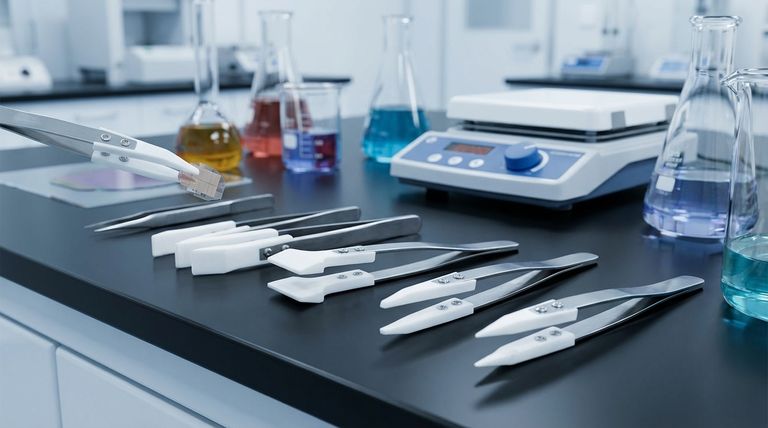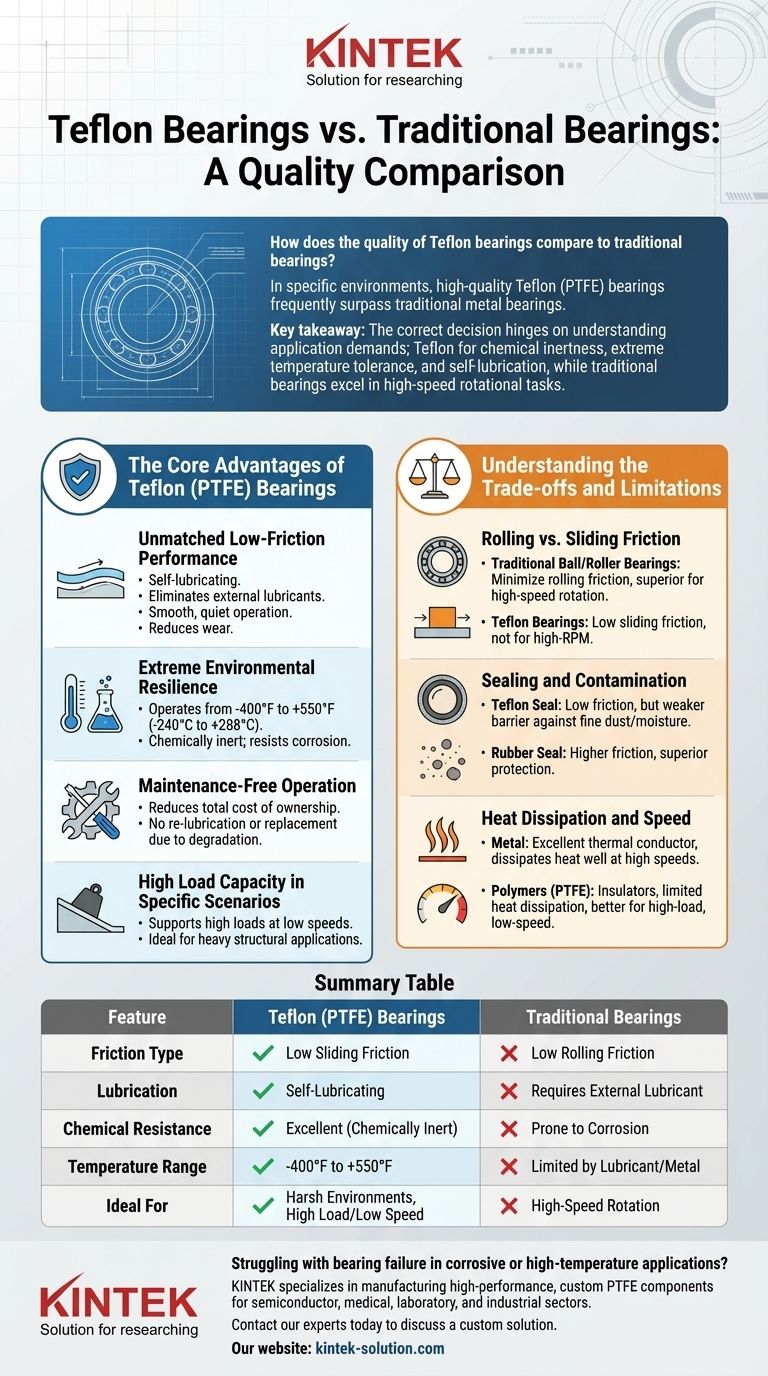In terms of material properties and performance in specific environments, high-quality Teflon (PTFE) bearings frequently surpass traditional metal bearings. Their unique advantages stem from an exceptionally low coefficient of friction, inherent self-lubrication, and remarkable resistance to chemicals and extreme temperatures. This makes them a superior choice for applications where traditional lubricated bearings would fail, corrode, or require constant maintenance.
The choice between Teflon and traditional bearings is not a simple matter of one being universally "better." The correct decision hinges on understanding that Teflon excels in applications requiring chemical inertness, extreme temperature tolerance, and self-lubrication, while traditional bearings are often superior for high-speed rotational tasks.

The Core Advantages of Teflon (PTFE) Bearings
The "quality" of a bearing is best measured by its performance and longevity within its intended operating environment. This is where Teflon's unique material characteristics create significant advantages over metal alternatives.
Unmatched Low-Friction Performance
Teflon possesses one of the lowest coefficients of friction of any solid material. This property is inherent to the material itself, eliminating the need for external lubricants like grease or oil.
This self-lubricating nature ensures smooth, quiet operation and dramatically reduces wear over the bearing's lifespan, especially in applications where regular maintenance is difficult or impossible.
Extreme Environmental Resilience
Teflon bearings demonstrate exceptional stability across a vast temperature range, operating effectively from -400°F to +550°F (-240°C to +288°C).
Furthermore, PTFE is almost completely chemically inert. It resists corrosion and degradation from virtually all industrial chemicals and solvents, making it the ideal choice for processing plants, laboratories, and other harsh environments.
Maintenance-Free Operation
The combination of self-lubrication and high resistance to corrosion and wear results in a truly maintenance-free component.
This reduces the total cost of ownership by eliminating the labor and material costs associated with re-lubrication and replacement due to environmental degradation.
High Load Capacity in Specific Scenarios
While often associated with smaller components, PTFE slide bearings are engineered to support exceptionally high loads at low speeds.
This makes them ideal for heavy structural applications, such as bridges and large buildings, where they allow for controlled movement and outperform traditional roller or rocker supports.
Understanding the Trade-offs and Limitations
No single solution is perfect for every problem. To make an informed decision, it's critical to understand the specific contexts where traditional bearings maintain an advantage.
Rolling vs. Sliding Friction
The primary distinction is between rolling and sliding friction. Traditional ball or roller bearings are designed to minimize rolling friction, making them exceptionally efficient for high-speed rotational applications like electric motors and vehicle wheels.
Teflon bearings operate on the principle of low sliding friction. While excellent for their intended use, they are generally not suited to replace ball bearings in high-RPM machinery.
Sealing and Contamination
In some bearing assemblies, Teflon is used as a seal material. A Teflon seal offers very low friction and rolling resistance but may provide a weaker barrier against fine dust and moisture compared to a traditional rubber seal.
A rubber seal creates more friction but provides superior protection against environmental contaminants. The choice represents a direct trade-off between maximum efficiency and maximum protection.
Heat Dissipation and Speed
Metal is an excellent thermal conductor, allowing traditional bearings to dissipate heat generated at high speeds effectively.
Polymers like PTFE are insulators and do not dissipate heat as well. This can become a limiting factor in very high-speed applications, reinforcing their suitability for high-load, low-speed scenarios.
Making the Right Choice for Your Application
Selecting the optimal bearing requires matching the component's strengths to the specific demands of the task.
- If your primary focus is high-speed rotation (e.g., wheels, motors): A traditional roller or ball bearing is almost always the superior choice due to its low rolling friction.
- If your primary focus is operation in a corrosive or chemical environment: Teflon's chemical inertness provides unmatched reliability and longevity.
- If your primary focus is a maintenance-free or unlubricated system: The self-lubricating nature of Teflon makes it the definitive solution.
- If your primary focus is supporting a very heavy, slow-moving structural load: A PTFE slide bearing is specifically engineered for this high-load, low-speed application.
Ultimately, selecting the right bearing is about matching the material's inherent strengths to the precise demands of your application.
Summary Table:
| Feature | Teflon (PTFE) Bearings | Traditional Bearings |
|---|---|---|
| Friction Type | Low Sliding Friction | Low Rolling Friction |
| Lubrication | Self-Lubricating | Requires External Lubricant |
| Chemical Resistance | Excellent (Chemically Inert) | Prone to Corrosion |
| Temperature Range | -400°F to +550°F | Limited by lubricant/metal |
| Ideal For | Harsh Environments, High Load/Low Speed | High-Speed Rotation |
Struggling with bearing failure in corrosive or high-temperature applications? KINTEK specializes in manufacturing high-performance, custom PTFE components, including seals, liners, and labware, for the semiconductor, medical, laboratory, and industrial sectors. Our precision-engineered Teflon bearings offer the durability and maintenance-free operation your critical processes demand. Contact our experts today to discuss a custom solution that will enhance your equipment's reliability and lifespan.
Visual Guide

Related Products
- Custom PTFE Parts Manufacturer for Teflon Parts and PTFE Tweezers
- Custom PTFE Parts Manufacturer for Teflon Containers and Components
- Customizable PTFE Rods for Advanced Industrial Applications
- Custom PTFE Teflon Balls for Advanced Industrial Applications
- Custom PTFE Sleeves and Hollow Rods for Advanced Applications
People Also Ask
- What industries use PTFE machined parts and for what applications? Critical Components for Demanding Environments
- What are the best practices for achieving tight tolerances in Teflon (PTFE) machining? Master Precision for Demanding Applications
- What are the key considerations when machining Teflon? Master Precision Machining for Soft Polymers
- How does PTFE contribute to low friction and wear resistance? Achieve Superior Performance with Advanced Materials
- Why is CNC machining preferred for Teflon parts over other methods? Unlock Precision & Complex Designs



















